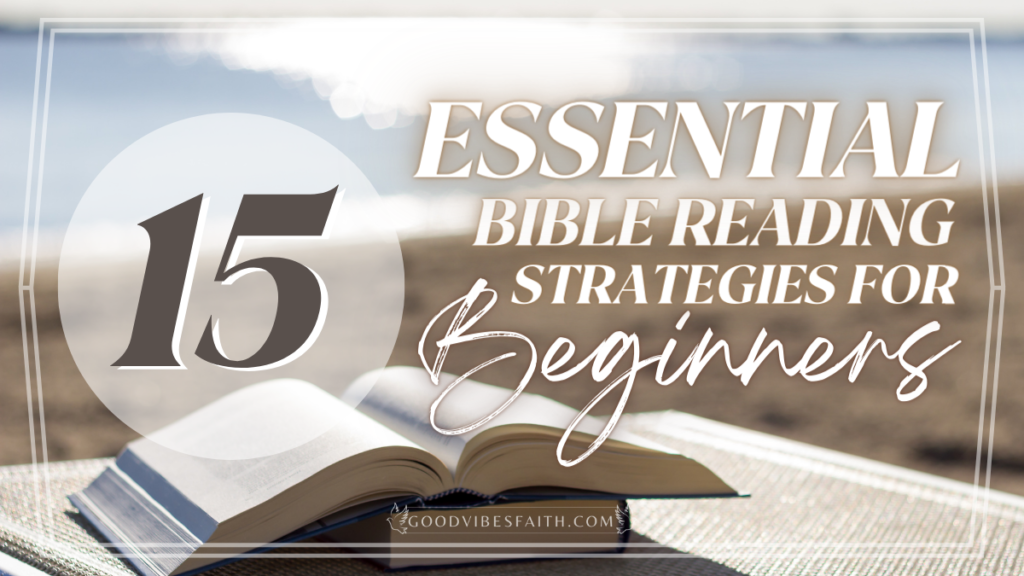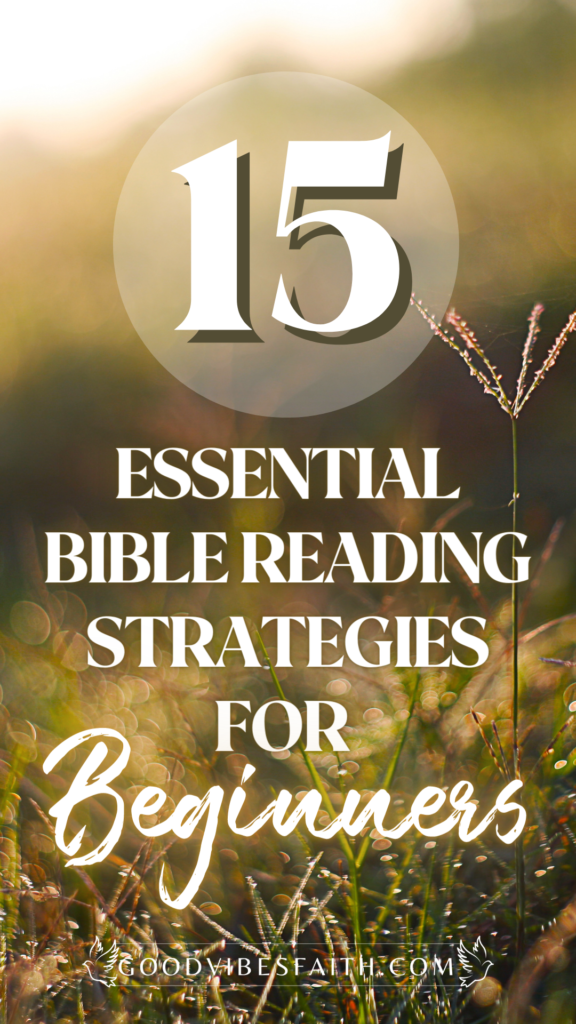15 Essential Bible Reading Strategies For Beginners

Are you looking for ways to get more out of your Bible reading? If you’re new to the Bible, or just want to learn how to read it better, there are some strategies that can help.
In this article, I’ll share some tips on how to approach Bible reading, including ways to find a starting point, choosing a translation, and using study aids. I’ll also offer some suggestions on how to keep your Bible reading fresh, including ways to go deeper, take breaks, and find a community.
Whether you’re just starting or have been reading the Bible for years, these 15 tips can help you get more out of your time with God’s Word.
1. Start By Finding A Good Translation That Makes Sense To You.
When it comes to Bible study, one of the most important factors is finding a translation that makes sense to you. There are many different versions of the Bible available. Some people prefer a literal translation that sticks closely to the original Hebrew and Greek, while others prefer a more dynamic translation that seeks to capture the meaning of the text in modern English.
There is no right or wrong answer when it comes to choosing a Bible translation. The important thing is to find one that you will be able to understand and that will help you grow in your faith. Some popular translations are the New International Version (NIV), the English Standard Version (ESV), New Living Translation (NLT), King James Version (KJV), and the New Revised Standard Version (NRSV).
2. Pray Before You Read.
The Bible is the word of God, and it is essential reading for anyone who wants to know more about their faith. However, it can be difficult to understand all of the Bible’s complex content. That’s why it’s important to pray before you read.
As you pray, ask God to give you understanding and wisdom. Pray that He will help you to see His truths more clearly and apply them to your life. With God’s guidance, you will be able to grow in your faith and knowledge of His Word.
3. Find A Comfortable Starting Point.
The Bible is a massive book, and it can be daunting to try to read it from start to finish. If you’re not sure where to start, a good place to begin is with the Gospels of Matthew, Mark, Luke, and John in the New Testament.
These books provide an overview of the life and teachings of Jesus Christ, and they offer a great introduction to the Bible as a whole.
Once you’ve read these four Gospels, you can move on to other parts of the Bible that interest you. There is no wrong way to read the Bible, so find a method that works for you and dive in.

4. Read With A Purpose. What Do You Want To Learn Or Gain From Reading The Bible?
When you approach the Bible, it is important to have a purpose in mind. What do you want to learn or gain from reading this ancient text? Everyone will have their own unique motivation for reading the Bible. Perhaps you are seeking spiritual guidance, looking for answers to tough questions about life, or simply hoping to gain a better understanding of the Christian faith.
Whatever your reason may be, approaching the Bible with a purpose will help you to get the most out of your reading. If you keep your goal in mind, you will be more likely to read with focus and attention, and you may be surprised at how much wisdom and insight you can glean from this ancient book.
And Jesus said to him, “If you can! All things are possible for one who believes.” Mark 9:23 (ESV)
5. Choose A Time And Place Where You Can Focus On Reading And Won’t Be Interrupted.
Bible reading is a vital part of the Christian faith. To get the most out of your Bible reading, it is important to choose a time and place where you can focus and won’t be interrupted. Set aside a regular time for Bible reading, and make it a priority. This will help you to establish a routine and ensure that you always have time for Bible study.
Choose a place where you feel comfortable and can focus on the Bible without distractions. It may be helpful to find a quiet corner in your house or sit in your backyard under a tree. Once you have found a good spot, settle in and let the Bible speak to you.
Allow yourself to be open to what God has to say, and don’t be afraid to ask questions. Bible reading is an important part of developing your relationship with God, so make it a priority in your life.
6. Start Small. If You’re New To Reading The Bible, Start With A Few Verses Or A Chapter.
The Bible is a big book, and it can be intimidating to try to read a lot of it at once. If you’re new to Bible reading, start small. Pick a few verses or even just a chapter. You can always work your way up to read more. Don’t feel like you have to rush through the Bible or that you have to finish it in a certain amount of time.
Take your time and enjoy the process. As you read, you’ll learn more about God and what he has in store for you. Bible reading is a great way to grow closer to God and to learn more about his plan for your life.
7. Be Patient With Yourself, And Don’t Expect To Understand Everything Right Away.
Bible study can be a daunting task, especially if you’re doing it on your own. There’s so much to learn, and it can be easy to feel like you’re not making any progress. But be patient with yourself, and don’t expect to understand everything right away.
Take time to mull over what you’ve read, and ask God to help you grow in understanding. The Bible is a complex book, and it takes time to unpack all its wisdom. But the effort is worth it because the Bible has the power to change your life. So don’t give up, and keep reading!
8. Don’t Be Afraid To Take Breaks If Your Bible Reading Feels Stale. You Can Come Back To It Later With Fresh Eyes And A New Perspective.
Reading the Bible helps us to understand God’s Word and apply it to our lives. However, sometimes our Bible reading can become stale. We can become bogged down in the details or we may lose interest in the story. If this happens, don’t be afraid to take a break.
Maybe put the Bible down for a few days and come back to it later. Alternatively, you could try changing up your routine. Maybe read a different translation or read through a commentary. Bible reading is important, but it should also be enjoyable. Don’t be afraid to experiment until you find a style that works for you.

9. Read Aloud. Hearing The Words Can Help You Understand And Remember Them Better.
This is a technique that has been used for centuries, and it still works today. When you read aloud, you are using two senses instead of just one. You are hearing the words as well as seeing them. This helps your brain to process the information differently, and it makes it more likely that you will remember what you have read.
You can use this technique when you are trying to memorize a verse. Just give it a try next time you are reading the Bible. You might be surprised at how well it works.
“So faith comes from hearing, and hearing through the word of Christ.” Romans 10:17 (ESV)
10. Use A Study Bible Or Other Resources.
Bible study can be challenging. Between the different versions, unfamiliar translations, and ancient language, it’s easy to feel lost. However, there are several resources available that can help you to understand the meaning of what you’re reading.
A study Bible is a great place to start, as it provides background information and commentary on the text. In addition, there are many excellent Bible commentaries available that can provide deeper insight into the meaning of the Scriptures. With a little effort, you can find the resources you need to gain a greater understanding of the Bible.
11. Read With A Friend Or Group. Discussing What You’re Learning With Others Can Help Deepen Your Understanding.
Reading with a friend or group can help deepen your understanding of the Bible and provide support as you grow in your faith. As you read, don’t be afraid to ask questions. If you’re not sure what something means, talk to a pastor or another trusted Christian friend. They can help point you in the right direction.
Finding a community of other believers to connect with is also important. This can provide accountability and support as you read and grow in your faith. By reading the Bible with others, you can deepen your understanding of God’s word and grow in your relationship with him.
12. Journal About What You’re Reading. Writing Down Your Thoughts And Questions Can Help You Process And Remember What You’ve Read.
When you read the Bible, do you ever feel like you’re just skimming the surface? Like there’s so much more to understand, but you don’t know where to start? Or maybe you’ve been reading the Bible for years and you feel like you’ve plateaued- like you’re not gaining any new insights.
Journaling can help with both of those problems. When you take the time to write down your thoughts and questions after reading a passage, you’re forcing yourself to process what you’ve read on a deeper level. And as you look back on your journal entries over time, you’ll be able to see how your understanding of the Bible has grown and changed.
So if you’re looking for a way to get more out of your Bible reading, try journaling! It might just be the key to unlocking new insights and a deeper understanding of God’s Word.
13. Memorize Key Verses. Having Scripture Memorized Will Help You When You Need Encouragement Or Wisdom Throughout The Day.
There is power in the words of the Bible. When we memorize key verses, we are carrying that power with us throughout the day. In moments of discouragement, we can recall the verses that tell us we are loved and valued.
In moments of temptation, we can quote the verses that remind us of what is right and good. And in moments of weariness, we can remember the verses that tell us to rest in God’s love.
By memorizing Scripture, we are equipping ourselves with the wisdom and encouragement we need to face whatever challenges come our way.
14. Pray After You Read. Thank God For His Word And Ask Him To Help You Apply It To Your Life.
The Bible is God’s Word to us, and it is powerful. It can change our lives if we let it. When we pray after we read the Bible, we are thanking God for His Word and asking Him to help us apply it to our lives.
This is a very important part of our spiritual growth. If we don’t pray, we may not see the changes that God wants to make in our lives. But when we pray, we are opening ourselves up to God’s power and grace. He can work in us and through us to change us from the inside out.
15. Don’t Give Up! Reading The Bible Can Be Challenging, But It’s Worth It. Persevere, And You’ll Grow In Your Faith And Understanding.
For many people, reading the Bible can be a tough task. It’s long, it’s complicated, and it can be difficult to understand. But don’t give up! The Bible is an essential part of the Christian faith, and it’s worth taking the time to read and study.
By persevering, you’ll grow in your faith and understanding. You may not always have all the answers, but the Bible can provide guidance, comfort, and hope in times of need.
Conclusion
Reading the Bible is an essential part of the Christian faith, and it can be a powerful tool in our spiritual growth. I hope you can apply some of these Bible reading strategies to your routine and find them helpful.
By taking the time to read, study, and apply the Bible to our lives, we can grow in our relationship with God and gain wisdom and guidance for everyday challenges. So keep reading, keep learning, and let the Bible transform your life.







